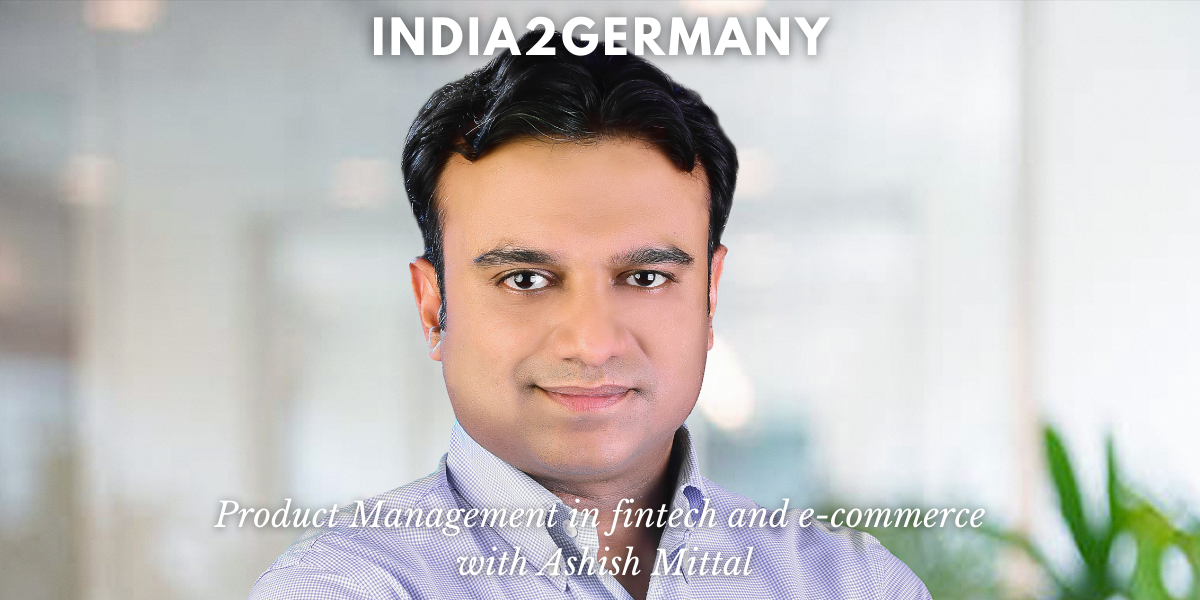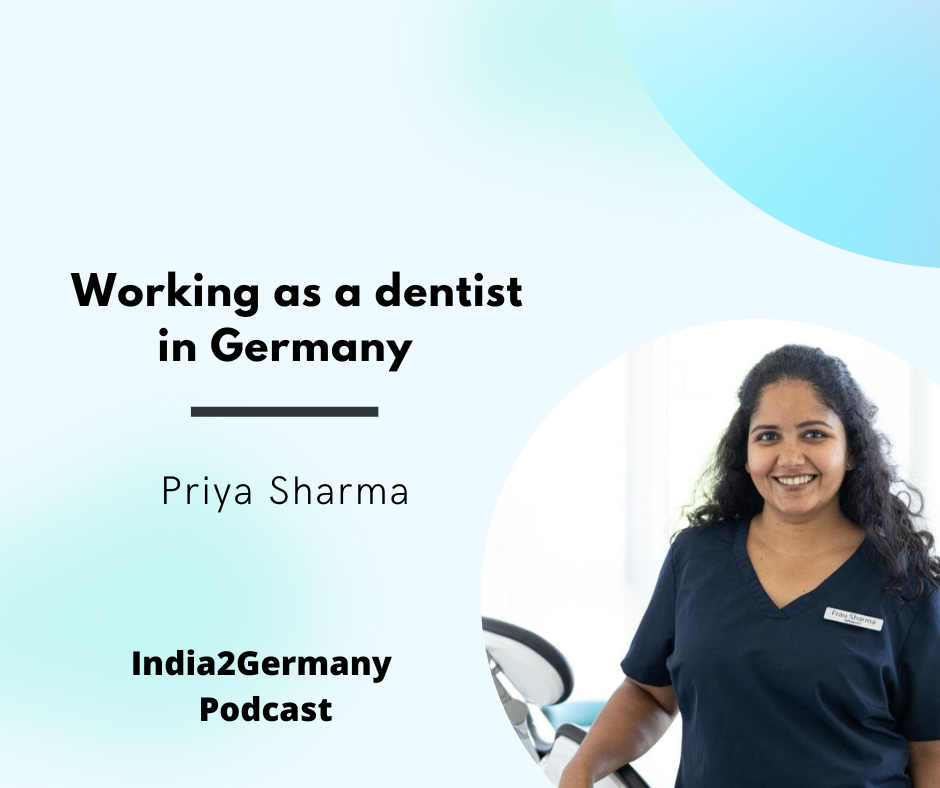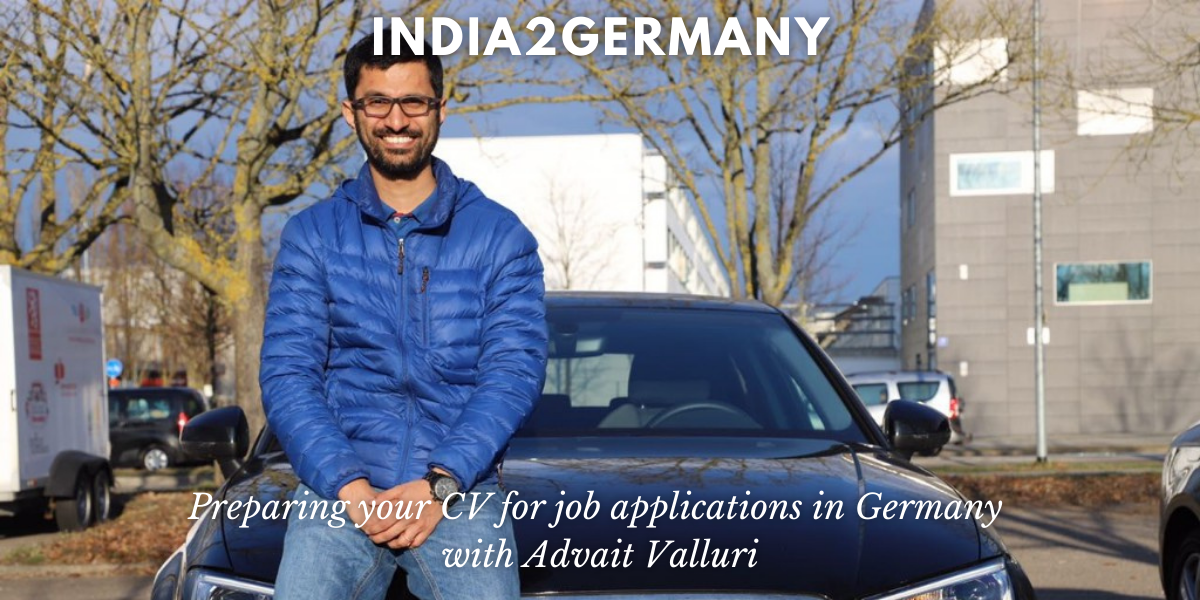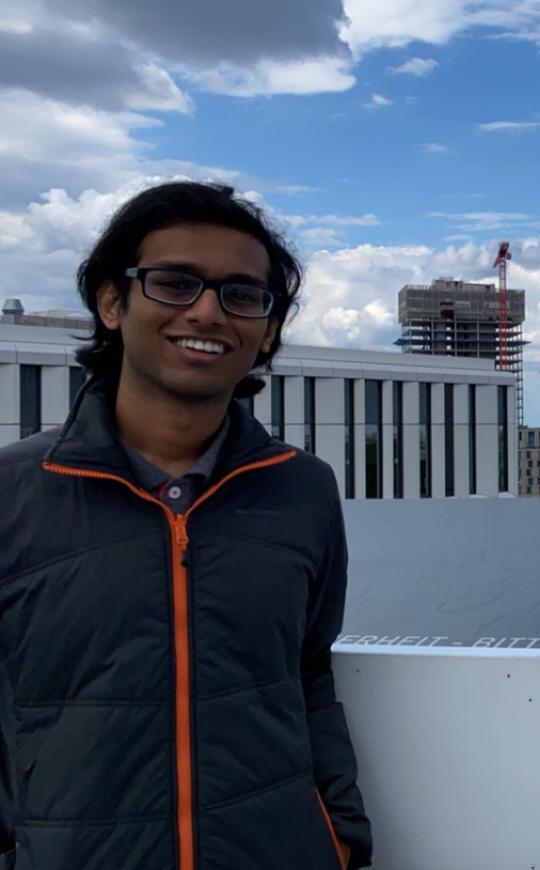
Product management in fintech and e-commerce with Ashish Mittal
Ashish is Head of Product Management at N26 in Berlin, and has a long-standing experience in product management and software development at Zalando, Flipkart and Oracle in Germany and India. He shares his experience and learnings with us.
Product management is one of the most sought after careers in the tech sector. Lying at the intersection of technology and business, it's core focus lies on user experience and solving consumer problems. Today on India2German, we speak with Ashish Kumar Mittal, Head of Product Management at N26, about his experience with product management. Apart from N26, Ashish has also worked for other big names like Flipkart, Zalando and Oracle, and he is highly experienced in the areas of fintech and e-commerce with a strong affinity towards startups.
🎙 You can also listen to this conversation on Spotify, Apple Podcasts, Google Podcasts, YouTube or your favorite podcast platform 🙂
Welcome Ashish 👋. Could you tell us a little bit about yourself?
Sure. So let me start from the early days. I'm basically from a small town in India, I was born and brought up in a city called Meerut, was pretty much an average student with a strong inclination towards sports. And the only other thing which I liked in my life was computers. Gradually I tended towards that a little bit more, and decided to do my engineering in Computer Science. Engineering is also probably one of the most common education aspirations in India. But I think I really, really liked computer science, I just wanted to get into that profession. So right after my engineering, I joined GE (via a consulting company), where basically, I was helping the GE aircraft engineers to predict aircraft engine faults, as a software developer. Then I worked as an engineer in Oracle, where I kind of realized the value of customer thinking, business thinking, you know, out of box thinking. And that's when I decided to quit my job, went back to school, did my masters in business, and from then on, I've been working more on the business/product/consumer side of the world. The way I see my life is that, I've worked for about 15-16 years so far. And I will probably work for another 30 years, at least I hope so. So in Jeff Bezos' language, it's still a day one of my professional life. Personally, I am an active investor, father of a three year old, who now started learning guitar at the age of close to 38.
Why did you choose to move to Germany?
It was more like an evolutionary process. After I did my masters, I was placed from campus in one of the subsidiaries of Bank of New York Mellon Corporation. And that's how I spent about four years in that company working for a wealth management product. And then, I joined Flipkart and spent many years over there. Around 2017 was a very unique time in my life. Professionally, I had already spent 6+ years at Flipkart in variety of roles. It was a really, really great journey. Personally, my wife and I, we were expecting a baby. And we had a thought that, you know, this is the best time for some personal experiments? Because once the kids grow up, it's very hard to move around. So yeah, we were originally very curious to go back to the US. But then as luck would have it, a couple of my close friends and past colleagues from Flipkart had recently moved to Germany at that point in time, and more so in Berlin. One of them was absolutely instrumental in me joining Zalando. So it started more as an personal experiment. We were planning to be here for 1-2 years only. But then now, of course, it's three years and we're still here. In hindsight, I would say that it was really great to be here in Europe and Germany, rather than going back to the US at that point in time because Europe in general, and Germany in particular have a very unique way of life, way of work, way of thinking, philosophy, and I'm very happy to have gained this experience after coming here. So that's my journey to Germany.
I would actually definitely say that probably the US and India are much closer than say… India and Europe in a lot of sense. But, they are all different cultures, and they all teach you so much. So it's always good to have a different perspective.
Flipkart is one of the most famous startups in India, particularly in the e-commerce space. You grew very fast in the company and became a Director there. What were your learnings from your time at Flipkart?
A whole lot (of learning and growth). I think there is nothing that I can say here, which can really quantify or which can really give an impression of how much I learned at Flipkart or how much I respect Flipkart. And think about it this way. When I joined in 2012, the company was relatively small. It was a couple of 100 people, if I exclude the operations, and customer support departments. Right now, it's probably 30,000+ employees. It was valued at a few 100 million dollars which was not extremely small, but small. Right now, I think we're talking about $40 billion of valuation in the IPO next year. So, it was a company in its early days, it was growing to double the size every alternate month. And being in such an environment brings tremendous learning. It was fabulous. We were celebrating 100 crores, and you know in less than a year, we were celebrating 500 crores and then it just kept on growing. But maybe in a nutshell, if I were to kind of really think about key learnings, I can point to two of them.
The first one is, which I learned from the founders and the leadership team was to set really audacious goals; goals that at first look impossible. So Sachin Bansal in 2013 or 2012 had a vision of $20 billion in 2020. And I'm sure a lot of people would have laughed at him at that point in time, because it just seemed impossible. This gave a good direction to where Flipkart. So set really audacious goals. And then what is more important is to chase them with all your heart, body and mind... and the results are inevitable. So this is my first learning. Just to elaborate a little bit on that, my thinking is that the strategy and planning phases of any project or any work that you do, are really, really important. It gives you a direction, it gives you a focus, it gives you a zeal of sorts, right? However, in the end, what really matters is execution, irrespective of how good you are in your planning and your vision setting in your roadmapping or strategy, things are invariably going to change. And at that point in time, you have to improvise on the fly. So, at that point in time, execution really is the best strategy. The second thing which I learned from Flipkart was the differentiation or valuing generalist versus specialist in a different way. So to give a little bit more context, there's a book called Range, which I came across when it was first recommended by a very avid investor, Vani Kola who's the MD of Kalaari Capital right now. I read that book after my journey at Flipkart. And it was almost like, I saw all the evidence and proof of what was written in the book already and then read the book. The thing is, it basically challenges what we have learned all our lives. As we grow up, a human mind is trained to take less risk, a human mind is trained to kind of have less standard deviation in their lives, right. So have a very straight path, which may or may not be the best thing to do. For example... If you look at the current leadership at Flipkart, even today, pretty much everyone is an expert in their area. But that was not the area when they started their career, they all worked in different parts of the organization. And I believe that they are really doing good right now. Because they have such a massive experience, holistic experience. Think about the CEO of Flipkart at this point in time. He was not a business guy all his life. He was an investor. Then he spent some time working in finance, he was the CFO, then he moved on to do some business roles. And now he's managing the entire company. Similarly, if you think about the CEO of Myntra, who is a friend, we worked together in multiple projects. But he was an engineer at heart, he was not a fashion person at all. I bet he's still an engineer at heart. But really going out and doing massively good for Myntra. The best example of all of them is probably the co-founder of PhonePe, which is another subsidiary of Flipkart. He is amazing, his name is Sameer Nigam, he worked in the US… moved back and started his digital music company… then as a part of it’s acquisition, he joined Flipkart, he became head of that digital business. Then he became head of marketing, then he became head of engineering. And now he's running one of the most successful payment organizations in India. So, long story short, it's not a coincidence that these guys are successful. I think the reason why they are successful is the ability to relate to what they have done in different areas and implement those learning in other areas. They can relate to things very differently, versus someone who would have spent all their lives in (say) payments, or someone who would have spent all their lives in fashion. So this is a really, really big perspective shift. By the way, these are just the top three examples. If you look at almost the entire leadership over there, pretty much everyone is as exemplary as these people. So really amazing.
📬 Get the latest India2Germany articles via email 📨
Fast forwarding to your current role as Head of Product Management at N26. What does the company do and what is it like to work at N26?
If you look at it at a super high level, you could think of N26 as a digital bank. You can think of it as just a bank, which doesn't have a physical presence. So there are no branches that you can walk into. But you can also think of it as a bank which lives in your phone. So every time you have to interact with your bank, instead of going to a bank branch, you just open your mobile phone app. At the core of it though, the ambition is greater. The ambition is to create a bank that 100 million users love to use. And this will obviously not happen by just the technicalities of creating a digital bank without branches, on your phone, etc. For this, everything has to be thought through ground up. So think about why were banks created in the first place? How have the users evolved over the years? What does it mean for banking experience in today's super connected work? What technology helps us from a banking domain perspective, which a few years back was not possible? People working at N26 are curiously questioning every single one of these assumptions on a daily basis, and creating products that our customers would eventually love to use. It's challenging and rewarding at the same time. That's it in a nutshell, how I would think about N26.
What do you find exciting and challenging at N26?
When you look at the mission, and the opportunities and possibilities that I just mentioned, it's very, very hard to not get excited about what you can change in the end customers' lives. Generally working to change the way one of the biggest and long standing industries (Banking) operate. And this is also an industry which has seen very little to no innovation over the last few decades. So it's only now in the last 10 years that we see some innovation. This (excitement) is also amplified significantly, as you can also see the output of your hard work or as a customer when you do something at N26. You're also a user of your product so you can see how it changes your experience on a daily basis. So on one side, the opportunity and the mission and the ambition is really huge. On the other side, you can live the output, or you can feel the impact of the output of your work at the same time. And to me, the combination of these two is extremely rewarding. At the same time, working at any startup, things are very fast. The industry is evolving on a daily basis that consumers are involved in on a daily basis, the organizations are evolving on a daily basis, the management is getting mature on a daily basis, we are all kind of improvising. This could at times lead to ‘adaptability fatigue’, which is what I would call it. So the amount and the frequency of changes could, at times be intimidating to some people. And it's across the board. It's not necessarily to only a very junior person or the top person, it's basically across the board. So, I would say that would be one of the challenges of working in any hypergrowth start-up.
You've worked for big names like Oracle, Zalando, Flipkart and N26, and you started out working as a software developer and moved into product management. Why did you decide to take up software development, and then move into product management?
This is a very good question. My reason to start working in software development was purely out of passion (for coding). I think as a child, I was interested in only a couple of things. One was sports, I was a soccer player. The second was writing code. I was not much into playing computer games, but writing simple design codes, like making a pattern with stars in GW Basic. Gradually, I tended a lot more towards software development, picked it as a field of education and then picked it as a career choice. And I was fairly successful. I was one of the youngest engineering leads at GE Aviation team(at TCS) at that point in time. What happened when I was in Oracle was actually what influenced me to move a little bit more towards consumers and towards product and towards business. In Oracle, I was working on a product where I was the only person in the team. So in the entire Oracle India team, I was the only person who was working on a product called IPayments. That was really the inflection point. It really helped me focus on what's really important in the end. Till that time, I was pretty much focused on KPIs, like uptime, response time, queries per second, accuracy, etc., you know, all of all the technical KPIs. And this was the time when I realized that user experience is super critical, the flow, bounce rate, the bigger picture, like, business value proposition, and what is the user really trying to achieve and is your software helping them achieve it. Its much bigger than just a technical metric. And that's where I decided to quit my job, went back to school and focus a little bit more on the consumer side, on the product side and creating value in general. So that was my transition to product management.
What do you think are some of the important skills for becoming a product manager?
I can give you my perspective. I think everyone will have a different view on it. But in my view, there are a few things which are very important. Essentially, what a product manager is doing is, he's trying to solve problems. She's trying to solve a problem, which matters to consumers and can create an impact in consumer's life. A lot of people are however not doing this. They are not asking ‘why’ enough. And I think they should kind of move to this sooner or later. But in order to do this, what you need is the first quality, in my opinion, is curiosity. A genuine curiosity about why users are doing certain things that they are doing, or, why is this not this way? Or why is x doing y and why is not y doing z? So general curiosity about things, general curiosity for technology, general curiosity to learn. The second most important, you know, quality, in my opinion, is customer obsession. I see a lot of people getting obsessed with technology and say, ‘hey, how do I use blockchain?’. I think that's a stupid thing to do. What really matters is to say ‘this is the problem I'm trying to solve for the consumer. And this is who my consumer is’. I need to be able to live what my consumer is going through in his mind, his philosophy, his thinking, his behavior pattern. Then the third very important quality, in my opinion, is product honesty. So what I mean by that is, you should be able to very critically challenge and question what you are thinking. A product manager has to be able to find faults in their own work. If they're not able to do that, they're not going to go anywhere. And maybe, the last one, I would probably add as well. And this is not just for product managers, but generally - people should have a very high level of positive energy, to be able to be successful in any role whatsoever. So yeah, I think curiosity, customer obsession, honesty, are very, very critical for product management, and very high positive energy, very critical even otherwise.
What are some of the opportunities for people looking to work at N26?
I think last year was a strange one. So if you look at the N26 trajectory, till about early last year, we were growing leaps and bounds. With obviously the pandemic happening, we were mindful, and cautious of a lot of things. And we wanted to wait and be responsible. So for our hiring, we were being a little bit more cautious. But now things are changing. So we are going back on interfaces, going back to hiring more broadly. And there are rules across the board. So I would highly encourage people to look at the career website of N26, there are roles from engineering, Product Management, Product Marketing, to Marketing, and the Growth function. So they're across the board, there are a lot of roles out there.

What would be your advice for people who are looking to move and establish themselves in Germany?
That's a good one. Let me start with this. Germany overall, and Berlin, I think are slightly different to each other in a way. Fortunately (or unfortunately), one of the side effects of working in a tech company in Berlin is that there is no inherent reason, or there is no fundamental push for you to understand and live the German culture or the European culture. Especially, let's say you're learning German. There is no advantage at work that you have over a person who is not speaking German, which in some ways is good. But in some way, it's not really that great as well. For anybody coming to Germany, I would highly, highly advise to set themselves up properly, right in the beginning, to learn the language, learn the culture, learn the people, get a driver's license, set up yourself for success. Because once you have already gone through some months, it becomes very difficult to find time to handle some of these things. You will be able to appreciate Germany much more, if you are nicely set up. So I would highly, highly advise to get some of these initial hurdles. Like a lot of people don't take driver's license in Berlin. I think it's really important for your quality of life. From my mistakes, I would highly advise to solve some of these things very early on in Germany.
I recently also saw on LinkedIn that you had posted some very positive views about 2021. I wonder what makes you so excited about the coming year?
It's really straightforward to think about 2020 in a certain way, especially in light of the COVID. You can think of it as something which brought a lot of pain, a lot of misery, a lot of restrictions. A lot of people also call it a wash. So basically a year where nothing really has happened. And this is all true. I'm not denying tha. My heart goes for people who have suffered, I have a couple of friends who have gone through really bad phase. This is really bad. And this is all true in a lot of sense. However, if you see it in a slightly different way, nothing really is the same anymore, it's not really a wash, it has changed so many things in so many different ways. The consumer patterns have changed dramatically. So the saving patterns have changed dramatically, the way people interact with their money has changed dramatically. The way people work in their offices has changed. You know, the way people learn has changed fundamentally, shopping has changed forever. There is this decades of digital transformation, which was compressed into one single year. I could probably go on and say that almost every running business that we had, in the starting of the year 2020 had to really reinvent itself to stay relevant in the new world. The ones who are not able to do it, or the ones who were very slow in getting there, have paid high price and will continue to pay high price going forward.
So in this context, historically speaking, this may be a great opportunity for some of the disruptive businesses to come in, and really transform the way business works and exploit different opportunities. Look at history, some of the biggest businesses were created during times like this. Microsoft was created in the oil embargo recession of the 70s. Amazon, Flipkart, Airbnb, Square, all during the time of recession or slowdown. So I believe that times like these fundamentally force people to think in structurally solving things in a completely different way. And this is the opportunity that I was talking about. I personally know some great talent who is starting up on concepts, which can totally be at the scale of any one of these companies in the next few years. I mean, I see some of them as becoming as big as Apple or Microsoft in let's say 10 years, 15 years. They at least have the potential, whether it happens or not, obviously, it's a different matter. But I think those opportunities are really real, really open. And people with the right mindset of taking risks, understanding user patterns, consumer behavior and problems will gain significantly in acting now. And so I'm super curious to see what happens next, especially in a couple of years from now, more prominently in 2021 and 2022. Certainly it is going to be a lot of startup action. I can't wait to see it happen.
📬 Subscribe to our newsletter to stay up-to-date! 👇
India2Germany Newsletter
Join the newsletter to receive the latest updates in your inbox.







